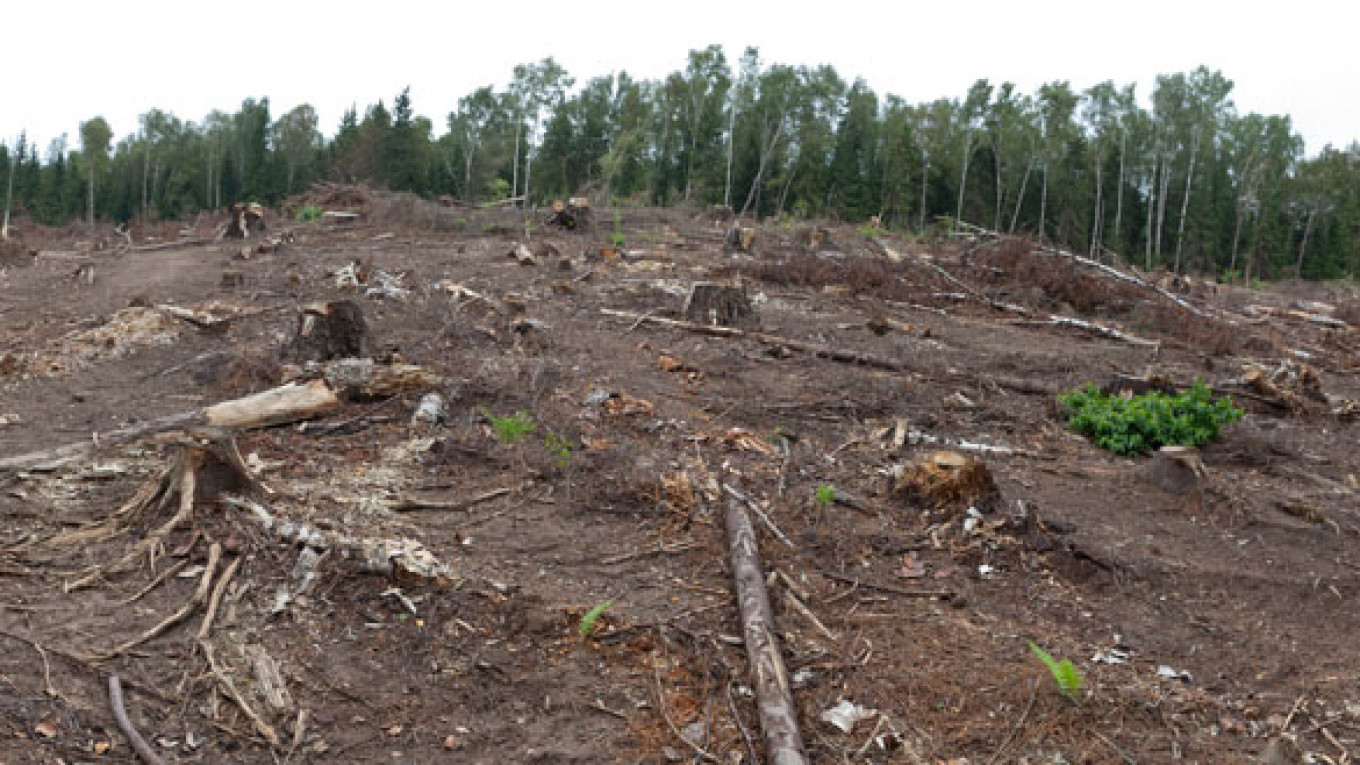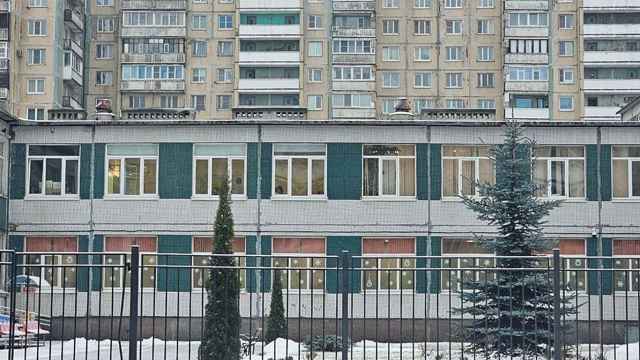Construction of the Moscow-St. Petersburg highway is too far advanced to be stopped and will run through the Khimki forest as originally planned, President Dmitry Medvedev said through his spokeswoman on Tuesday.
The announcement comes as a bitter disappointment to environmentalists, who thought they had won a rare victory when Medvedev ordered a halt to road construction in August and set up a commission to consider alternative routes.
But Deputy Prime Minister Sergei Ivanov, who chaired the commission, announced Tuesday that the commission recommended that the $8 billion highway should run through the Khimki forest as originally planned.
"The decision will be fulfilled," Medvedev's spokeswoman Natalya Timakova told reporters later in the day.
Emphasizing that the decision could “not be decided by ecological factors alone,” Ivanov told reporters that “from a legal point of view the specified route is completely justified.”
Environmentalists, who say 65 percent of Russians oppose the forest route, refused to accept the news, saying the final decision still lay with President Dmitry Medvedev — not his spokeswoman or Ivanov.
“We still say what we said before: The decision still lies with Medvedev if he is really the president of our country,” said Yaroslav Nikitenko, a spokesman for the defenders of the Khimki forest. “Now we'll see whether he is on the side of the bureaucrats or the people.”
Nikitenko added that the environmental movement would return to the streets in protest, joining opposition protesters on Triumfalnaya Ploshchad on Dec. 31.
Medvedev won approval from anti-road campaigners when he halted construction and ordered a “public discussion” following a series of high-profile protests this summer. But political analysts said Tuesday that the green movement was doomed to disappointment.
“There was never any chance of an alternative route being chosen. Too much money had already been spent on the original route,” said Alexei Mukhin, head of the Center for Political Information. “All the authorities did was take a timeout to let public opinion cool off. It was a good tactic on their part.”
The government seemed determined to appease opponents by portraying the decision as a difficult choice between two imperfect options — one through the Khimki forest, and the other via the settlement of Vashutino.
Explaining their preference for the route through the forest, ministers said the alternative would be only marginally less expensive, take longer to build, and require the demolition of 50 houses. It would also require the felling of 90 hectares of forest — not much less than the 100 hectares to be cleared on the original route.
“The cost of the current plan is 51 billion rubles [$1.6 billion]; the alternative would cost 48.5 billion [$1.58 billion], not counting compensation for the houses and the land beneath them in Vashutino,” Transportation Minister Igor Levitin told the meeting Tuesday.
The residents who would have to move were deeply opposed to the idea, he said.
Levitin, who forest defenders have accused of corruption in connection with his support for the road, said the eight-kilometer section of road running through the Khimki forest could be finished by 2013, but the alternative would not be ready before 2017.
In an apparent effort to appease environmentalists, Ivanov said 500 hectares of trees would be planted to compensate for the 100 hectares felled to make way for the road.
He also promised that no gas stations or other roadside buildings would be allowed on the section that runs through the forest, and that sound barriers would be erected on the sides of the road to protect local wildlife.
Presidential aide Arkady Dvorkovich suggested posting video cameras at “key points that are particularly vulnerable from an environmental point of view” to ensure that builders did not damage the surrounding countryside. The proposal echos a promise made by Prime Minister Vladimir Putin this summer to make sure that builders finished the reconstruction of houses destroyed in forest fires by using video cameras to monitor developments.
Environmentalists were unimpressed. “The extra trees will simply never be planted,” said Alexei Yablokov, head of the environmentalist faction in the opposition Yabloko party.
An independent environmental survey expected to condemn the decision will be released on Dec. 20, Nikitenko said.
Moscow region Governor Boris Gromov called Tuesday's decision “extremely positive” and said road work would resume on Jan. 15, after the New Year holidays. Gromov is one of the road's biggest backers, and was singled out by the forest defenders as a key player set to benefit financially from the route.
The federal roads agency agency, Rosavtodor, which contracted the French firm Vinci to build the Khimki section of the highway, told Interfax that it was “delighted” by the decision, but a representative declined to comment further when contacted Tuesday.
Vinci did not respond to several requests to comment.
The highway is to be built on a concessionary basis under which investors will receive the right to levy tolls on the sections of road they build. The Khimki section, which will also serve Moscow's Sheremetyevo Airport, is the first concession project involving a major foreign firm.
Vinci signed a 30-year concession contract to design, finance, construct and operate the 43-kilometer section in July 2009. The total construction cost was estimated at the time at 1 billion euros ($1.34 billion), and the work was meant to take 36 months.
Finishing the whole road could take “easily 10 years,” said Dmitry Baranov, a transportation analyst with the Finam investment company.
“We simply don't know when it will be finished," he said. "Other sections of the road have not even been tendered for yet, and there are immense construction challenges including crossing rivers and marshy ground."
For similar reasons, he said, it was impossible to estimate the eventual costs of the massive engineering project.
Critics point to a study by Transparency International that identified potential conflicts of interest in the Transportation Ministry in connection with the road.
A series of brutal attacks on journalists have been linked to their coverage of the road. The editor of the Khimkinskaya Pravda newspaper, Mikhail Beketov, was left unable to speak after a savage 2008 beating widely believed to have been linked to his critical reports about the road and Khimki's mayor. In November, Kommersant reporter Oleg Kashin, who wrote about the road, and forest defender Konstantin Fetisov were brutally beaten in unsolved attacks.
The road has even influenced high politics. In September, then-Mayor Yury Luzhkov backed the forest route soon after Medvedev had called for a halt to construction. Political commentators said his remarks looked like a deliberate slight to Medvedev and might have contributed to his ouster shortly afterward.
A Message from The Moscow Times:
Dear readers,
We are facing unprecedented challenges. Russia's Prosecutor General's Office has designated The Moscow Times as an "undesirable" organization, criminalizing our work and putting our staff at risk of prosecution. This follows our earlier unjust labeling as a "foreign agent."
These actions are direct attempts to silence independent journalism in Russia. The authorities claim our work "discredits the decisions of the Russian leadership." We see things differently: we strive to provide accurate, unbiased reporting on Russia.
We, the journalists of The Moscow Times, refuse to be silenced. But to continue our work, we need your help.
Your support, no matter how small, makes a world of difference. If you can, please support us monthly starting from just $2. It's quick to set up, and every contribution makes a significant impact.
By supporting The Moscow Times, you're defending open, independent journalism in the face of repression. Thank you for standing with us.
Remind me later.






